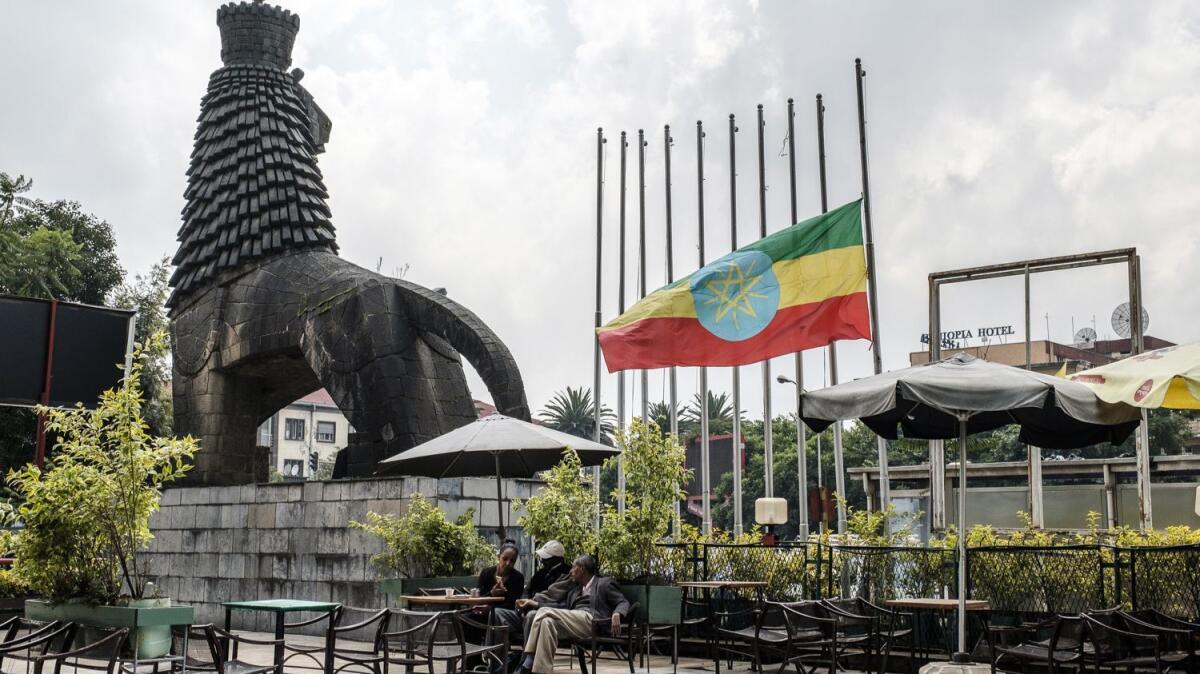Plotter of failed Ethiopia coup killed, 182 others arrested

- Share via
Reporting from ADDIS ABABA, Ethiopia — The Ethiopian army general accused of leading a failed coup in a restive northern region was killed Monday in a firefight with security forces amid a security crackdown in which more than 180 others have been arrested.
Brig. Gen. Asamnew Tsige was killed on the outskirts of Bahir Dar, capital of the restive northern Amhara region, government spokesman Nigussu Tilahun told the Associated Press.
Ethiopian forces had been hunting down Asamnew since Saturday, when soldiers loyal to him attacked a meeting of the Amhara government, killing the regional governor and his advisor. The regional attorney general, wounded in that attack, died Monday, according to local media reports.
The attack Saturday was followed hours later by the assassination in the nation’s capital, Addis Ababa, of the chief of Ethiopia’s military and a retired army general by a bodyguard.
The killings were widely seen as an attack on reformist Prime Minister Abiy Ahmed, who has pushed through sweeping reforms since his election last year.
Asamnew, the renegade general blamed for the violence, had been pardoned by Abiy after being jailed by the previous government for allegedly plotting a coup. He had recently used social media posts to incite a rebellion in Amhara, according to reports in the Ethiopian media.
The shootout in which Asamnew was killed comes as the government roots out others suspected of supporting the rebellion. Four high-ranking officials in Amhara, including the deputy head of security there, were taken into custody Monday, according to Abere Adamu, chief of the Amhara police commission. An additional 178 people have also been arrested on suspicion of taking part in violence in the region, he said.
An internet shutdown remains in force across Ethiopia after Saturday’s killings.
Flags flew at half-staff throughout Ethiopia on Monday, which was declared a day of national mourning after Saturday’s violence. Addis Ababa was peaceful as soldiers stood guard in Meskel Square and manned roadblocks throughout the capital.
The 42-year-old Abiy has captured the imagination of many with sweeping political and economic reforms, including the surprise acceptance of a peace agreement with Eritrea, the opening of major state-owned sectors to private investment and the release of thousands of prisoners, including opposition figures once sentenced to death.
Although Abiy’s reforms are widely popular, some members of the previous government are unhappy with the changes, and the prime minister has survived a couple of threats.
Last June, a grenade meant for Abiy killed two people and wounded many others at a big rally. Nine police officials were arrested, state media reported. In October, rebellious soldiers protested over pay and invaded Abiy’s office, but the prime minister was able to defuse the situation.
Ethiopia is a key regional ally of the U.S. in the restive Horn of Africa region.
Tibor Nagy, U.S. assistant secretary of State for African affairs, said the latest violence was a “shock, but it could have turned out so much worse,” adding: “Thankfully, Prime Minister Abiy escaped this attempt, because there are many, many more people in Ethiopia who support his reforms than those who are opposed to them.”
Speaking in South Africa on Sunday, Nagy said “there are vestiges of the old regime” who are opposed to Abiy.
“I wish I could say that this is will be the last of these attempts,” he said, “but no one can be certain.”
More to Read
Sign up for Essential California
The most important California stories and recommendations in your inbox every morning.
You may occasionally receive promotional content from the Los Angeles Times.










